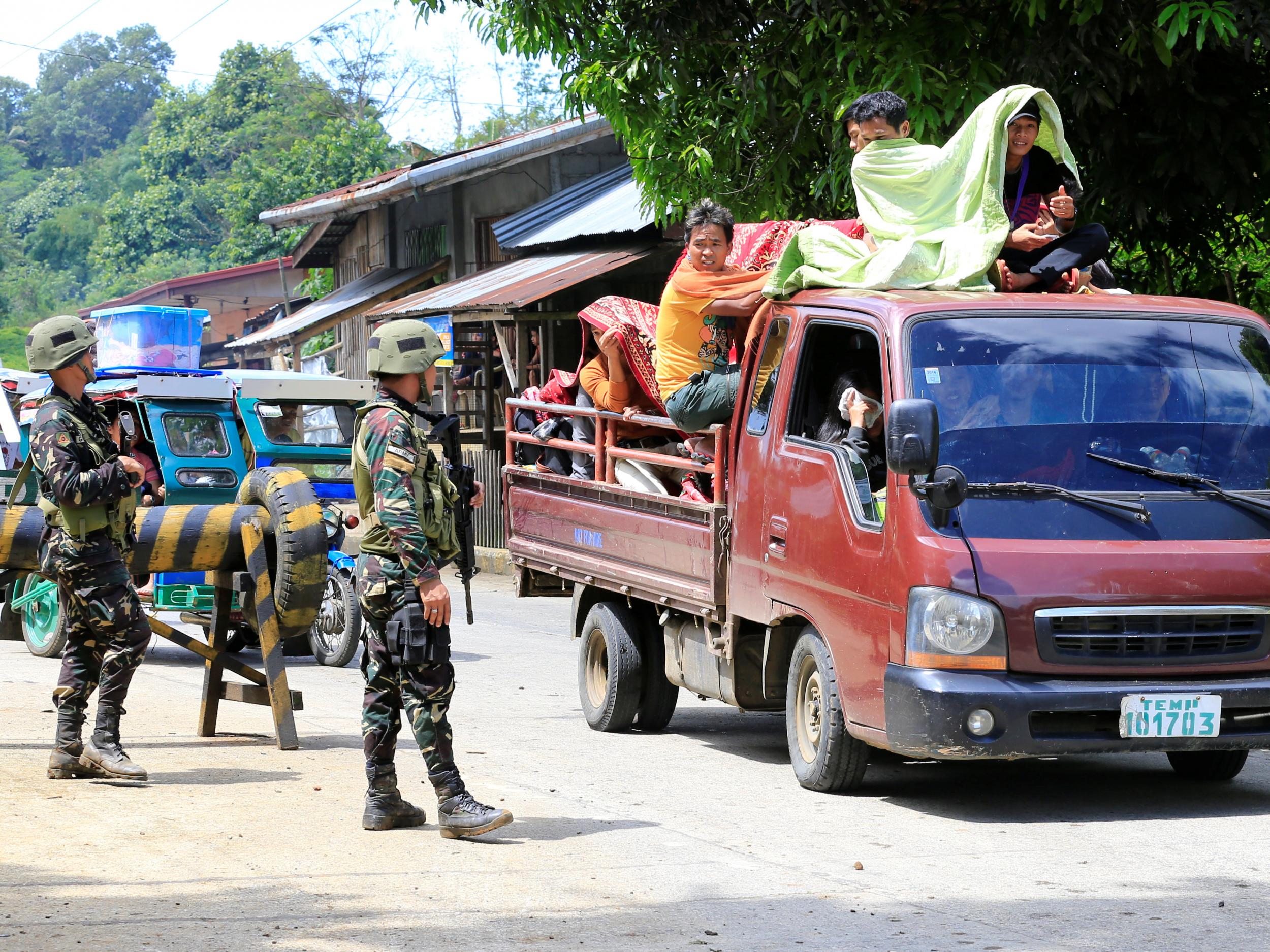Philippines President Rodrigo Duterte threatens to deal ‘harshly’ with Isis militants in Marawi
Martial law declared on Mindanao island as troops battle Maute and Abu Sayyaf rebels on streets following botched raid

Your support helps us to tell the story
From reproductive rights to climate change to Big Tech, The Independent is on the ground when the story is developing. Whether it's investigating the financials of Elon Musk's pro-Trump PAC or producing our latest documentary, 'The A Word', which shines a light on the American women fighting for reproductive rights, we know how important it is to parse out the facts from the messaging.
At such a critical moment in US history, we need reporters on the ground. Your donation allows us to keep sending journalists to speak to both sides of the story.
The Independent is trusted by Americans across the entire political spectrum. And unlike many other quality news outlets, we choose not to lock Americans out of our reporting and analysis with paywalls. We believe quality journalism should be available to everyone, paid for by those who can afford it.
Your support makes all the difference.Philippine President Rodrigo Duterte has warned he would deal harshly with militants, after declaring martial law on Mindanao island following a failed raid on a hideout of Isis-linked rebels.
Duterte cut short a visit to Russia and placed the southern island of 22 million people under military rule on Tuesday, and said he would keep it that way for a year if necessary.
Fighting abated in the mainly Muslim city of Marawi as troops sought to contain dozens of rebels of the Maute group, who escaped a botched raid on Tuesday on an apartment and took over streets, bridges and buildings and sought to block army reinforcements.
Duterte is a Mindanao native and has long threatened martial law to destroy two groups linked to Isis, which he warns is trying to gain a foothold in the Philippines.
He said the situation in Mindanao would be similar to the tough 1970s rule of late dictator Ferdinand Marcos, remembered by many Filipinos as one of the darkest chapters of their recent history.
“To my countrymen who have experienced martial law. It would not be any different from what President Marcos did. I'd be harsh,” Duterte said onboard a flight back to Manila, in a video sent by his staff.
“If it would take a year to do it then we'll do it. If it's over with a month, then I'd be happy. To my countrymen, do not be too scared. I'm going home. I will deal with the problem once I arrive.”
Two soldiers and a policeman were killed and 12 people wounded in Marawi, where Maute fighters took over buildings and set fire to a school, a church and a jail.
The military and government gave few details about the clashes nor did they say if any rebels had been killed.
Authorities insisted the situation was under control but residents who fled told a different story and said Marawi was in the hands of the rebels, who had allowed civilians to leave.
“The city is still under the control of the armed group. They are all over the main roads and two bridges leading to Marawi,” student Rabani Mautum told Reuters in nearby Pantar town, where some residents were leaving in overloaded trucks.
“I was in school when we heard gunfire... When we came out there were blood stains in the building but we did not see dead or wounded.”
Critics and even economists chided Duterte for what they saw as an overreaction in declaring martial law on an island the size of South Korea after an incident in one city.
Some activists expressed concern that it would lead to human rights abuses.
Martial law will last an initial 60 days. According to the constitution, Duterte has until Thursday night to explain his decision to congress.
He was due back in Manila on Wednesday afternoon.
Tuesday's raid was aimed at capturing Isnilon Hapilon, a leader of the Abu Sayyaf group notorious for piracy, banditry and for kidnapping and beheading Westerners.
The United States has since 2001 offered a bounty of $5 million for Hapilon's arrest. The military said they believed he had was wounded during the latest fighting.
The Maute and Abu Sayyaf have pledged allegiance to Isis and have proved fierce opponents for the military.
A photograph from one resident showed a black flag flying in Marawi that looked similar to that of Isis.
Duterte has warned repeatedly that Mindanao, an impoverished region beset by decades of unrest by separatist and Marxist guerrillas, was at risk of “contamination” by Isis fighters driven out of Iraq and Syria.
He has made development and foreign investment in Mindanao a priority of his presidency.
Armed forces spokesman Edgard Arevalo urged the public not to be alarmed if they saw checkpoints and soldiers.
“This is not a reflection of a major conflict looming, but this is a reflection of the capacity of our security forces to respond to any threat,” he said.
He said the Maute group was showing off to Isis.
“They are merely courting the acclamation of Isis which until now they haven't received.”
Copyright Reuters
Join our commenting forum
Join thought-provoking conversations, follow other Independent readers and see their replies
Comments